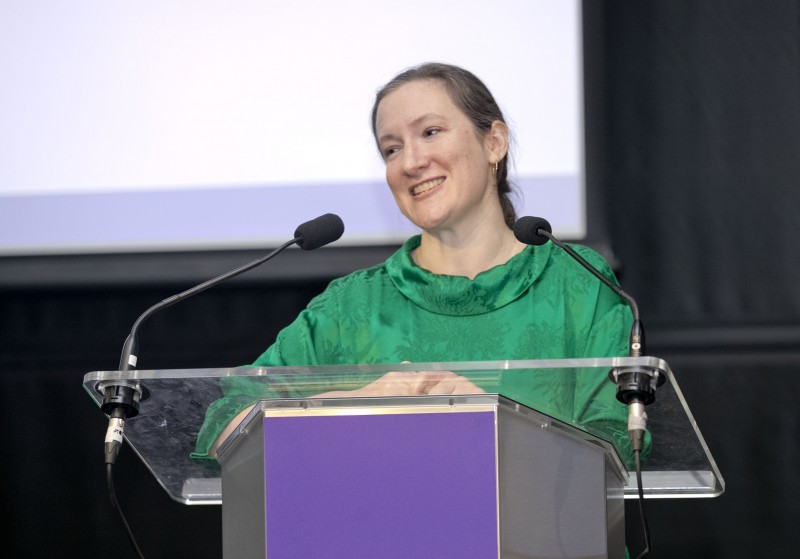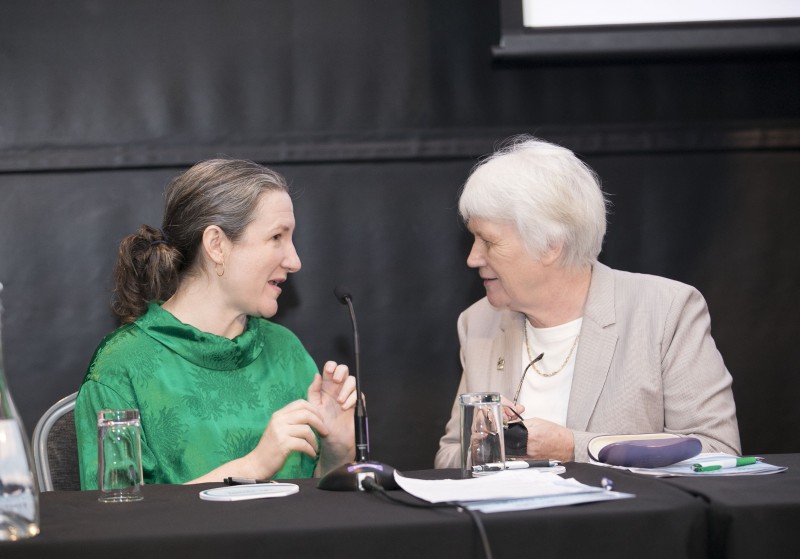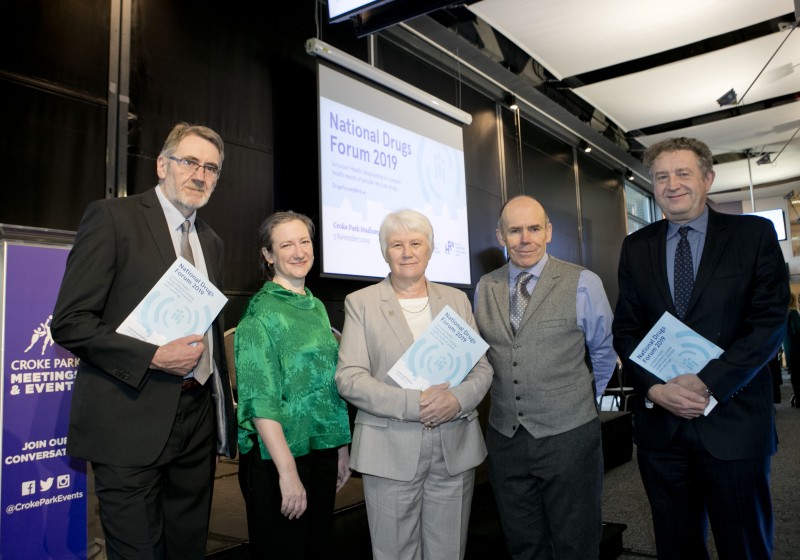Galvin, Brian (2020) National Drugs Forum 2019. Drugnet Ireland, Issue 72, Winter 2020, pp. 6-8.
| Preview | Title | Contact |
|---|---|---|
|
PDF (Drugnet 72)
- Published Version
600kB |
The theme of the 2019 National Drugs Forum was ‘Inclusion Health: responding to complex health needs of people who use drugs’. Opening the forum, Minister of State with responsibility for Health Promotion and the National Drugs Strategy, Catherine Byrne TD, said:
There are people in our society who struggle with health problems but feel isolated and cannot access the help and support they need. Our shared goal must be to reach out and deliver better health outcomes for these people and, in particular, to make our health and social services more inclusive for those in addiction who may also have other complex needs.
The two keynote speakers at the forum made important contributions to our understanding of the concept of inclusion health and the practical implications of configuring Ireland’s healthcare services to meet the needs of its most vulnerable populations. Professor Andrew Hayward, director of UCL Institute of Epidemiology and Health Care, and Dr Clíona Ní Cheallaigh, consultant in infectious diseases and general medicine in St James’s Hospital, Dublin, shared their experience from clinical work and their knowledge gained from academic work on the impact of inequality and marginalisation on health.

Dr Clíona Ní Cheallaigh
Design thinking
Following the keynote talks, the forum participants took part in an exercise called Design Thinking, which was used to frame group discussions around a few defined problems. Design thinking facilitates the generation of creative, problem-solving ideas. One of the hallmarks of the approach is that it is user-centred; it revolves around the needs of the individual service user, client, or stakeholder. The approach encourages divergent thinking and seeks to stimulate ideas that go beyond the obvious.
The participants in each group shared the knowledge and experience they have gained through working in various types of services in an open discussion on a particular problem. The purpose was not necessarily to provide a solution to the problem, but to think creatively about it. Working through the problem in this way can help with the analysis of real, everyday problems in the workplace and provide pointers on how to work together with colleagues to solve them. Each group of forum participants worked on a particular scenario. The scenarios included a limited profile, or persona, of someone facing a particular problem. Before considering how to respond to the situation described in the scenario, the groups worked on developing the persona further to make it more meaningful.
The groups used a number of idea generation techniques to refine the ideas they came up with. They were asked to be expansive in their thinking and not to be overly concerned with possible obstacles or a lack of resources. There were five scenarios in all and, following each group’s deliberations, a representative from each group joined others who had been working on the same scenario. These participants then compiled a workbook, representing a distillation of the discussions around each particular scenario. An account of the work of the forum participants is presented below.
Persona needs
The needs of each persona were arranged under functional, social, and emotional headings. Functional supports tend to focus on the type of services that would enable the persona to better understand and manage their own situation. While standard healthcare, child support, and family support services were frequently mentioned, a number of participants suggested that assistance with legal issues was important. This should cover interaction with the criminal justice system, family concerns, such as child custody, and welfare matters. It was seen as important that the persona did not suffer further financial disadvantage as a result of being unaware of entitlements; expert advice in this regard was frequently mentioned as an important resource.
Participants frequently mentioned the importance of helping to establish or re-establish social connections. The impact of loneliness on the persona’s recovery capacity was frequently cited. Friendships and role models are important aspects of social support. Hobbies and sporting activities need to be encouraged, as these can help alleviate social isolation. Many of the emotional needs identified relate to, or overlap with, the social aspect. Negative emotions – such as guilt, shame, fear, anxiety, trauma, self-stigma, and hopelessness – compound the persona’s inability to build social connections. Reinforcing social values through, for instance, establishing connections with one’s children, was frequently referred to. Relationship counselling and dealing with intrapersonal problems such as mistrust are often needed to establish a healthy emotional state. Emotional barriers compound other barriers to recovery and the feelings of being exhausted, in emotional pain, and powerless require focused responses. Many participants emphasised the need to feel safe and one underlined the importance of the persona’s capacity to manage pain, restore autonomy, and establish feelings of self-worth.

Dr Clíona Ní Cheallaigh (left), keynote speaker with Minister of State with responsibility for Health Promotion and the National Drugs Strategy, Catherine Byrne TD, at the National Drugs Forum
Blue sky strategy
Under the ‘create’ heading, participants were asked to list a series of current activities that they would eliminate, reduce, or raise and identify new courses of action. The harmful consequences of working in silos were observed in a number of groups and there was an emphasis on the need for greater integration of services. Some noted that there was an overly medical approach to opiate use problems and there was a need to examine alternatives. Although it had already been identified as an issue under the ‘barriers’ heading, several groups stressed the importance of removing, or seeking to reduce, feelings of stigma among services users. From a service-level perspective, the time spent on administration, such as forms and dealing with insurance issues, was seen as a resource that took from more immediate work. There is a need to avoid duplicating services or competing for resources.
Integration of services was a common theme under the ‘raise’ heading in this part of the exercise. The need to combine different treatment modalities and knowledge in one setting through multidisciplinary working in case management, dual diagnosis services, and early intervention for adverse childhood experiences was mentioned. One specific idea that emerged was for a special case management service for people with complex and multiple needs. This service should be available throughout the country. Allied to this approach was the proposal for an inclusion hub that would enable a multidisciplinary team to provide both mental and physical health services together. Alongside this need for more consolidation and security, the importance of national evaluation frameworks and the development of a more rigorous research community was identified.
The treatment continuum, implied in the concept of recovery, and the key role of service users in designing this process is part of the aspiration for greater integration and consolidation. When considering the ‘create’ heading, many participants suggested expansion of services in different ways, including out-of-hours support and working on access to services. Information technology was a consistent theme, with the idea of an information hub, the use of apps, social media, online information, and online diary support mentioned. The interest in integrating services under the ‘raise’ heading is echoed under support for a one-stop arrangement where all services are gathered together in one physical location. Although it was not explicitly tied to the need to lessen the burden of stigma, a number of participants said that decriminalisation of drug possession for personal use would be an important step.
Concept board
Each group was asked to arrange their responses to the situation faced by the persona under mild, stretch, and wild descriptors. Developments that need a slight adjustment in service delivery or additional effort on the part of policymakers would come under the mild category. Responses under this heading often mentioned family supports, which should include helping to deal with the young person at risk of deeper involvement in drug use or further harm, or preschool supports and the involvement of teachers in family support work. One suggestion was for a national community support service supporting community care managers. There would be a ‘national brand’ helping to challenge stigma and negative portrayals of the service user. Practical solutions such as a virtual hub, which would support teleconference work, was an idea put forward by the same group of participants. Access to the hub would be by self-referral and the client would identify their own needs. An app would give access to someone like a key worker regardless of where the person requiring the service lived. Access to a multidisciplinary team would eliminate the need to be physically present to avail of services.
Innovative solutions organised around families was the focus of some of the proposals. One was the notion of a ‘foster family’ for families, allowing them to stabilise their accommodation situation or resettle. The model of the au pair could be used to enable a mother to work on mentoring and companionships, while some of the day-to-day burdens of domestic responsibilities were lifted. Reconnection with children, supported by legal services, was also mentioned. The idea of a ‘recovery village’ was mentioned by one group but not explained in detail.
Inclusion health policy
The Department of Health is currently developing an inclusion health policy. It is considering the international evidence relating to the concept and how the experience of implementing programmes based on inclusion health can inform policy in Ireland. Making use of experience and understanding the perspective of both service providers and potential service users will be a key component of the development of policy in this area. The ideas generated through the design-thinking exercise at the National Drugs Forum will form part of the learning on which this important policy initiative will be based.

At the National Drugs Forum in Croke Park were (L to R) Mr Jim Walshe, Principal Officer, Drugs Policy Unit, Department of Health; Dr Clíona Ní Cheallaigh, St James’s Hospital; Minister of State for Health Promotion and the National Drugs Strategy, Catherine Byrne TD; Dr Peter Robbins, Dublin City University, who led the design-thinking exercise; and Professor Andrew Hayward, Director of the Institute of Epidemiology and Health Care at University College London
Repository Staff Only: item control page